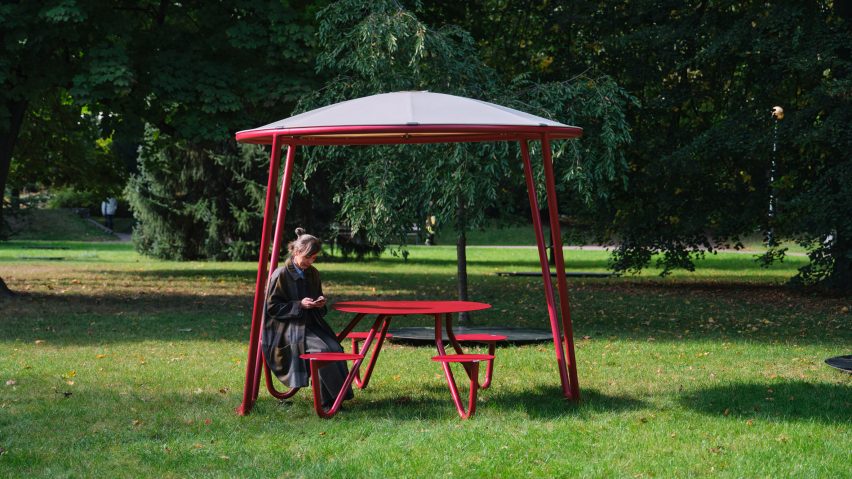Promotion: Czech brand Mmcité has been creating urban furniture for 30 years but continues to adapt to the "constantly evolving" needs of public space, says founder and creative director David Karásek.
Mmcité's benches, bins, bike racks and bus shelters can be found in 40 countries around the world, from Mont Blanc to the Dubai Water Canal and Google's global headquarters in California.
It is known for durable yet aesthetically pleasing products developed in collaboration with Czech and overseas designers. The output is as varied as it is prolific, with everything coming out of its design studio in the town of Uherské Hradiště in the south-east of the Czech Republic, close to the Slovakian border.
Through its contributions to public space, the brand sees itself as a leading producer of high-quality design accessible to everyone.
"For Mmcité this is nothing short of a cultural mission," explained Karásek. "We highly value our cities, so we are always pushing to make them more beautiful."
"Public spaces in a city are fascinating places where people and history meet," he told Dezeen. "I am proud that we focus Mmcité design right here – we can influence everybody's taste, and we love that."
Street furniture is sometimes regarded as an under-appreciated design discipline, but Karásek believes the best examples deliberately avoid drawing attention to themselves.
"Yes, street furniture can be overlooked, and I partly think it's a good thing," he said. "It means it doesn't disrupt the given place, it is not too loud. Instead, it fits in and complements the surrounding architecture."
Balancing high aesthetic standards with all the requirements of street furniture – such as durability, affordability, sustainability and inclusivity – is a tall order.
As a result, Mmcité sometimes spends years developing its products – some of which never see the light of day.
"We develop products honestly, and they must always meet all essential parameters," said Karásek.
"Well-designed street furniture can be compared to well-designed architecture," he added. "Functional buildings bring us joy in their use – thoughtful layout and aesthetics influence our daily lives and our senses."
"The same principles are applied in our field to urban furniture and public spaces."
Mmcité's most recently launched products are the Morse seating collection, designed by Belgian design practice Studio Segers, and the UFO public shelter, designed in-house. They join the Typo 3D-printed concrete planters among the brand's recent releases. The Morse and UFO designs recently scooped Red Dot Awards.
Taking its name from the dot-dash communication method, Morse consists of round or stadium-shaped seats positioned along a single linear bar.
Customisable and available in a range of materials, it is intended for use indoors or out, such as in parks, on riverbanks or in airport terminals.
UFO is an alternative to umbrella-based shelters that rely on a central mast. Its sturdy steel frame is topped by a fabric dome stretched over laminate rods.
An optional levitating circular platform turns the UFO into a daybed, which the brand said is a response to an increasing trend for people seeking undisturbed relaxation in public spaces.
Shifting demands of public spaces require Mmcité to continue to innovate after three decades of designing urban furniture, Karásek explained.
"Like every area of our lives, public space is constantly evolving," he said. "Private merges with public. There are also elements appearing that were not there before and stem from our life needs."
"These can be smart elements for charging our mobile devices, green roofs that, among other things, reduce dustiness in cities, or inclusive elements."
One key change is the move away from car-centric urban design in some cities around the world, said Karásek.
"Mobility in cities is changing, and in some markets, we see a tendency to remove cars from metropolitan public spaces," he noted.
"In other markets, so-called 15-minute cities are emerging, addressing people's needs within walking distance. Thanks to having everything within reach, city life is much better, and our products must respond to this."
For Mmcité, Karásek explained, innovating in response to these wider factors is "we are not talking about any revolution but about continuous evolution".
Despite a string of accolades to its name over the years, including Good Design, Red Dot, IF Design, EDIDA, and Czech Grand Design awards, Karásek is most proud when Mmcité's products continue to be used by the public over long periods of time.
"They function in public spaces for 20 years and are still a full part of it," he said.
"Sometimes we can see them seemingly destroyed, for example, tagged, which gives them a patina but at the same time, they are fully functional. So, we are delighted with thousands of products and projects worldwide."
For more information on Mmcité, visit its website here.
Partnership content
This article was written by Dezeen for Mmcité as part of a partnership. Find out more about Dezeen partnership content here.

